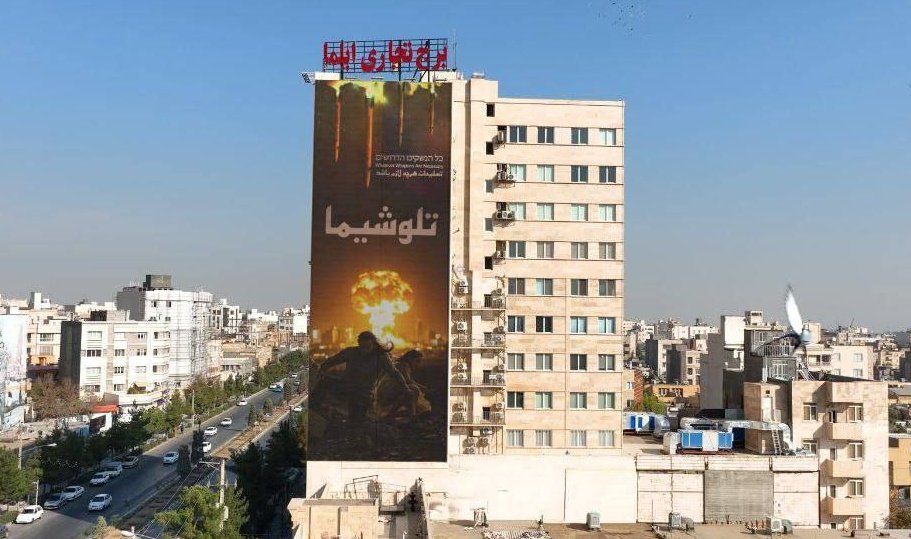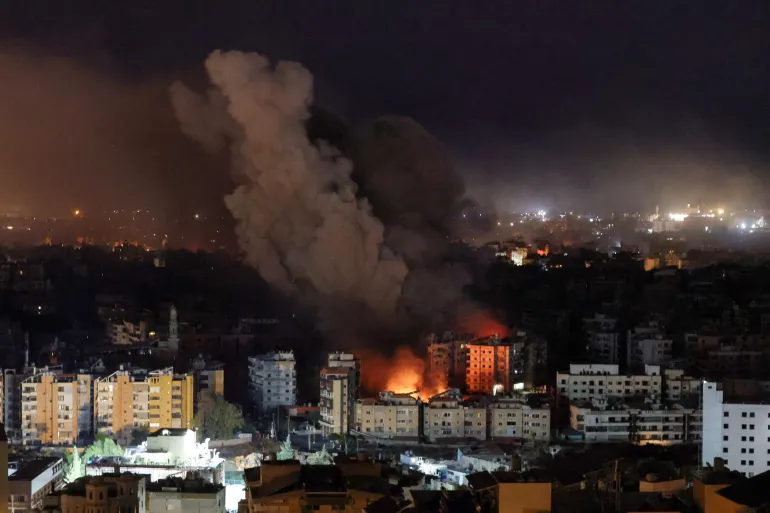WORLD
Controversial ‘Teloshima’ Poster in Tehran Combines ‘Tel Aviv’ and ‘Hiroshima’ Amid Rising Tensions

In Tehran, a provocative poster has surfaced, featuring the word “Teloshima,” a stark and chilling combination of “Tel Aviv” and “Hiroshima.” This imagery evokes two deeply significant and symbolically loaded locations: Tel Aviv, the heart of Israel, and Hiroshima, the Japanese city devastated by an atomic bomb in 1945.
The message behind this fusion seems to be an implicit warning of catastrophic consequences, blending the idea of a potential attack on Israel with the horrific aftermath of nuclear warfare. The poster’s appearance comes amid heightened tensions over Iran’s nuclear program, as the international community remains divided over how to approach Iran’s growing nuclear ambitions and the threat they pose to regional stability.
The timing of the poster coincides with rising political discourse around the future of U.S. policy toward Iran. The upcoming U.S. presidential election has taken on extra significance, with global powers closely watching how the next American leader will address the Iranian nuclear threat.
As the U.S. continues to grapple with the nuclear deal known as the Joint Comprehensive Plan of Action (JCPOA), the election could determine whether the U.S. takes a harder stance on Iran’s nuclear development or adopts a more passive approach. Some argue that the next president will either take decisive action to halt Iran’s nuclear progress or adopt a strategy of containment and diplomacy, potentially allowing the regime more time to reach its nuclear goals.
The stakes are incredibly high, not just for Israel, but for the broader Middle East and global security. Iran’s nuclear ambitions have long been a source of contention between the U.S., Israel, and other Western nations. Israel, in particular, has expressed deep concerns about the prospect of a nuclear-armed Iran, seeing it as an existential threat to its very existence.
For Israel, a nuclear-armed Iran could alter the balance of power in the region, embolden Iran’s proxy forces, and increase the risks of conflict. The idea of “Teloshima” in the poster may reflect Iran’s rhetoric on Israel, but it also underscores the dire consequences of a nuclear-armed Iran from the perspective of Israeli security.
The U.S. presidential election is thus seen as a critical juncture. Candidates’ positions on Iran are likely to be a major point of debate, with differing views on how to balance diplomacy with deterrence. Some advocate for a more confrontational stance, including military options to prevent Iran from acquiring nuclear weapons, while others emphasize renewed engagement through diplomacy and sanctions relief.
The Iranian government, meanwhile, continues to assert that its nuclear program is for peaceful purposes, but many in the West remain skeptical, citing Iran’s history of non-compliance with international agreements. The next U.S. president, regardless of their approach, will play a pivotal role in shaping the future of global nonproliferation efforts and determining the course of action on one of the most volatile issues in contemporary geopolitics.






![Top Nigeria Newspaper Headlines Today 25th June 2024 [Tuesday] 79 Nigeria Newspaper Headlines](https://nigerianews247.com/wp-content/uploads/2024/04/Nigeria-Newspaper-Headlines-80x80.png)

![[VIDEO] Tinubu Stumbles while Boarding Presidential Parade Vehicle at Eagles Square 82 Tinubu Stumbles while Boarding Presidential Parade Vehicle at Eagles Square](https://nigerianews247.com/wp-content/uploads/2024/06/Tinubu-Stumbles-while-Boarding-Presidential-Parade-Vehicle-at-Eagles-Square-80x80.jpeg)


You must be logged in to post a comment Login